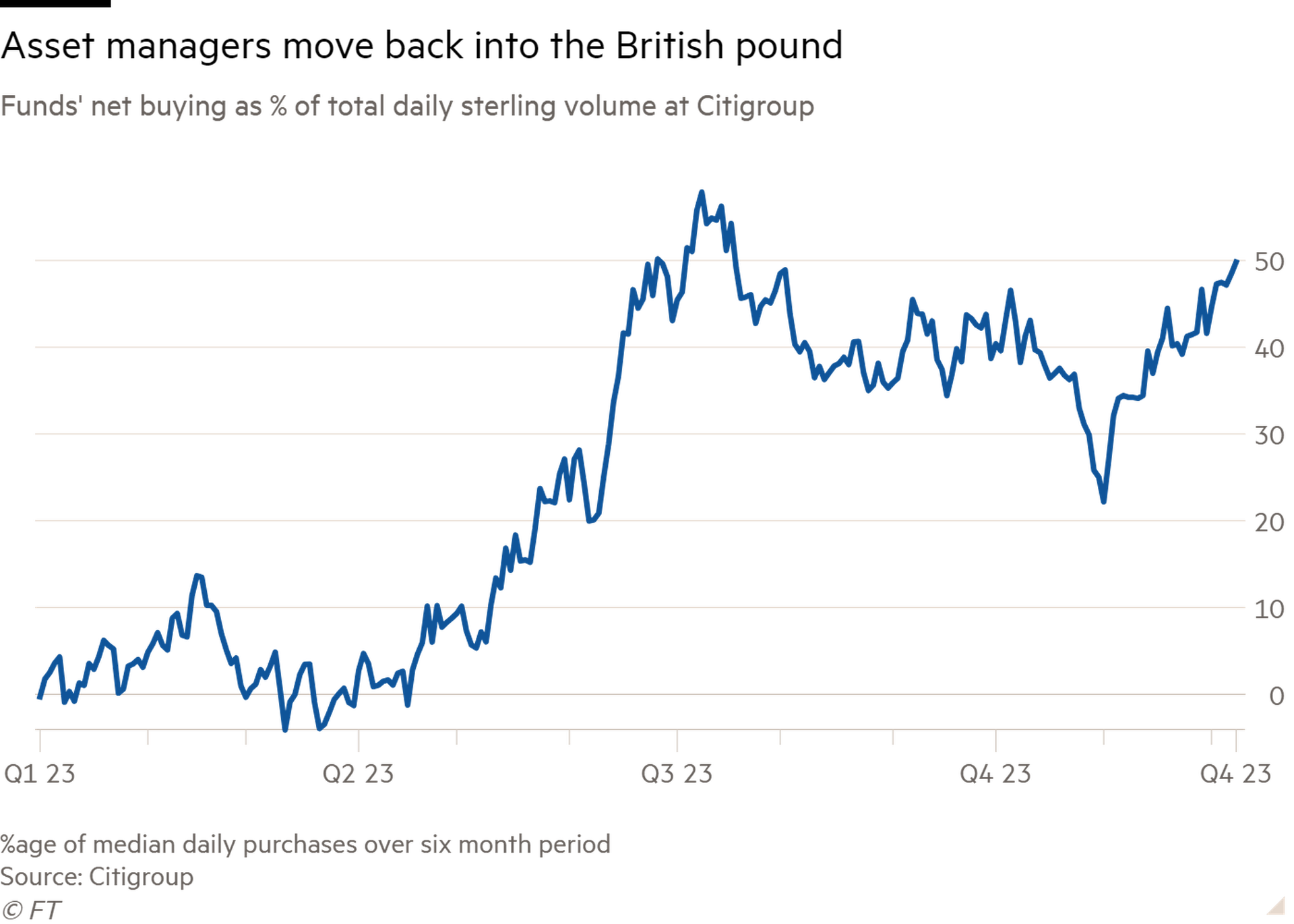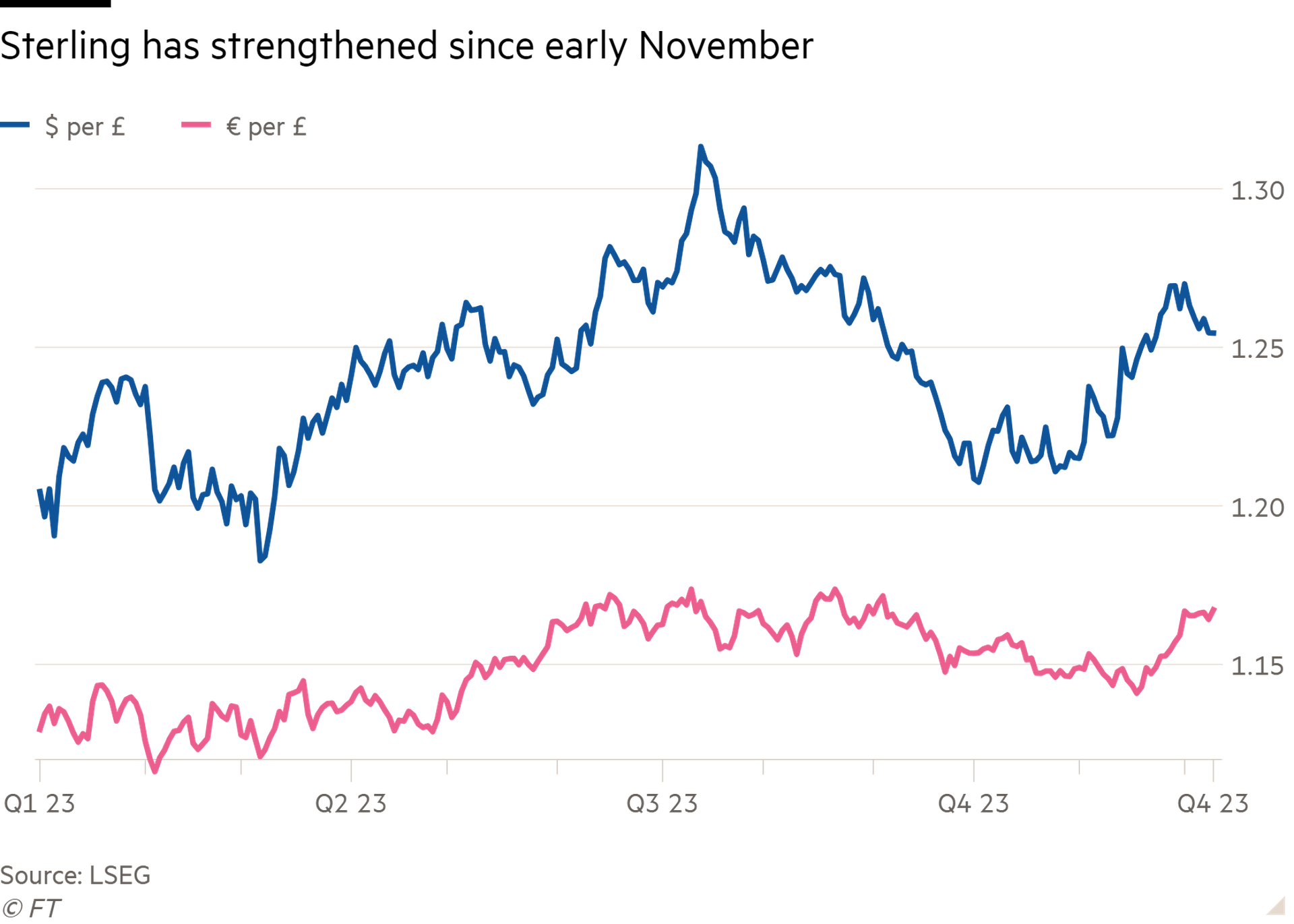Investors and currency speculators have boosted bets on the pound as expectations grow that the Bank of England will be slower than other central banks to cut interest rates.
As markets brace for central banks’ final rate decisions of the year this week, overseas investors have been scooping up sterling at the fastest clip since the summer while price pressures remain higher in the UK than elsewhere.
Data from Citigroup, which trades 130 currencies with a presence in more than 60 countries, showed that asset managers had ramped up sterling purchases since the start of November, a move that analysts said was partly a reflection of expectations that the BoE would be forced to keep interest rates high well into next year.
Markets are now pricing in three or four 0.25 percentage point rate cuts for the BoE next year, compared with four or five cuts for the Federal Reserve and five or six cuts for the European Central Bank over 2024.
Purchases of sterling by fund managers, as a percentage of Citigroup’s daily activity in the pound, has risen from 22 per cent to nearly 50 per cent in the last six weeks.
“After a period of neutral to slightly net negative flows our global real money clients have become net sterling buyers again,” said Sam Hewson, head of FX sales at Citigroup, adding that “sterling buying flows over the past month were [the] biggest since July 2023”.

Other banks have seen a similar trend. John Velis, foreign exchange and macro strategist at BNY Mellon, which is custodian to $45tn of assets, said overseas holdings of sterling have returned to “close to normal” long-term averages having been “meaningfully underweight for most of the year until just a few weeks ago”.
He said a reduction of hedging against sterling assets from overseas investors was in part because the UK will lag other countries in cutting rates. “This means that the cost of hedging sterling exposures based on forward rates will become more expensive,” he said.
Support for sterling comes as the pound has been the second best performing currency in the G10 this year. The UK avoided a widely predicted recession but ramped up interest rates to 5.25 per cent in an attempt to tame Britain’s outsize inflation problem.
Analysts say the pound has been boosted by the BoE’s insistence its battle to fight inflation is not yet won, despite signs in the labour market on Tuesday that the impact of higher interest rates is starting to feed through.
Andrew Bailey, BoE governor, warned markets in November that they were underestimating how persistent inflation would prove.
Michael Metcalfe, head of macro strategy at State Street, said sterling purchases were not only driven by expectations that the Fed would more aggressively cut its rates, weakening the attractiveness of the dollar.
The bank had also seen notable purchases of sterling against the euro “which suggests this is a more broad based reassessment of the pound rather than being a product of changes in the US dollar and Fed views,” he said.
State Street’s data showed that since November asset managers had been buying sterling at the fastest pace for seven months, but still remained “the biggest outright ‘underweight’ position asset managers hold across the 33-currenices we track”.

Speculative investors, such as hedge funds, have also turned positive on sterling, according to the latest weekly data from the US Commodity Futures Trading Commission, the US derivatives regulator. So-called leveraged non-commercial funds held more than 11,600 net long positions for the week to 5 December, turning bullish for the first time since late September.
Economists polled by Bloomberg forecast that sterling will be $1.29 at the end of next year, an increase from its current level of $1.25.
On Friday, Goldman Sachs raised its forecast for sterling, predicting it will trade at $1.30 in six months time, up from a previous prediction of $1.20.
“At least in theory, recent market developments should be very positive for sterling,” said Kamakshya Trivedi, head of global foreign exchange at Goldman Sachs.
“The market has moved towards pricing a soft landing that also incorporates some rate relief, which should be good for cyclical and rates-sensitive currencies like sterling,” he said, adding that a quicker move to rate cuts elsewhere will make the BoE “less of a dovish outlier”.
The central bank came under sharp criticism earlier this year for not acting strongly enough in response to price pressures, even after the UK’s headline inflation rate peaked at more than 11 per cent last year.
Goldman predicts the euro will weaken to £0.82 in the next six months from a current level of £0.86.